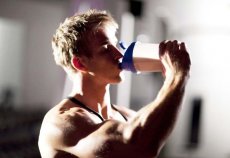Medical expert of the article
New publications
The need for fat intake for athletes
Last reviewed: 04.07.2025

All iLive content is medically reviewed or fact checked to ensure as much factual accuracy as possible.
We have strict sourcing guidelines and only link to reputable media sites, academic research institutions and, whenever possible, medically peer reviewed studies. Note that the numbers in parentheses ([1], [2], etc.) are clickable links to these studies.
If you feel that any of our content is inaccurate, out-of-date, or otherwise questionable, please select it and press Ctrl + Enter.

Fat diets for athletes vary greatly depending on the sport, training level, and performance level of the athlete. Although there are no sport-specific dietary recommendations, an athlete's food intake generally reflects the energy requirements of the sport during training and competition. In general, endurance athletes, runners, and cyclists have been observed to consume diets that meet the general guidelines for dietary fat (<30% of energy from fat). Distance runners consume 27-35% of energy from fat, and professional Tour de France cyclists consume approximately 27%. Rowers, basketball players, and Nordic combined skiers consume diets containing 30-40% of energy from fat. On the other hand, gymnasts and figure skaters, where appearance is important to performance, are known to consume dietary fat in the range of 15-31%.
Consequences of a low fat diet
Most sports diets follow general dietary guidelines, i.e. at least 30% of energy comes from fat. However, endurance athletes who want to be more competitive, and gymnasts and figure skaters who want to look better, may want to follow a very low-fat diet (no more than 20% of calories from fat) to avoid increasing body weight and body fat percentage.
Some athletes, especially endurance athletes, seek to increase carbohydrate intake at the expense of fat to increase glycogen stores. In either case, low-fat diets may not meet the growth and developmental demands of young athletes and the energy demands of endurance performance. In addition, low-fat diets over long periods of time may contribute to the development of essential fatty acid and fat-soluble vitamin deficiencies in athletes.
The intake of minerals such as calcium and zinc may also be at risk. In female athletes, very low-fat diets may cause menstrual dysfunction and impair future reproductive function. In male athletes, such diets have been shown to cause low serum testosterone levels, which in turn may affect their reproductive function. Therefore, very low-fat diets are not recommended for athletes.

